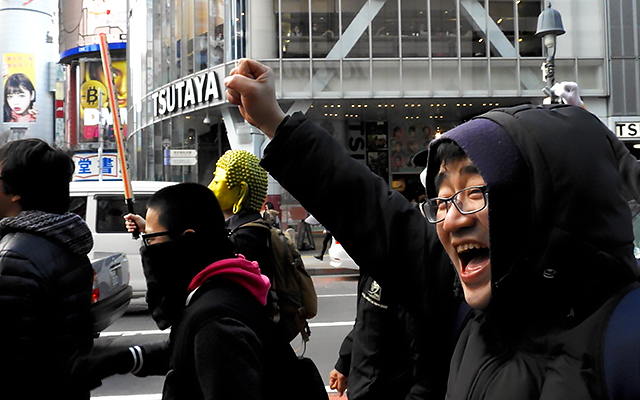- Source:
- © Kakumeiteki Himote Doumei / @kakuhidou
- Tags:
- anti love capitalism / celibacy / Christmas / demo / demonstrations / doutei / giri-choco / h / Kakumeiteki Himote Doumei / league / love capitalism / March / nijigen / Otaku / protest / revolution / revolutionary league / riajuu / slogan / squad / Valentine's Day / White Day
Related Article
-

Trendy Bubble Tea Stand ‘The Alley’ Show Their Deer Love for Japan on Valentine’s Day
-

Japan’s Kirby Cafe reveals romantic ‘Chocolate de Pupupu’ menu in time for Valentine’s Day
-

Trendy boba tea shop The Alley serves up Chocolate Caramel Milk Tea for Valentine’s Day
-

Eshi-100 Exhibition of 100 Leading Anime and Manga Illustrators in Akihabara
-

Make Your Sweet-Toothed Sweetie Swoon on White Day With This Beautiful Crepe Bouquet
-

Two-For-One Ramen for Pairs on Valentine’s Day at Ippudo Ramen Shops Nationwide



(Updated with information on 2019 demo)
On February 12th, 2018, a very unusual kind of demonstration wound its way through the busy neighborhood of Shibuya in Tokyo. The participants, holding slogans, and some wearing masks to hide their identities, were not affiliated with any major political organization and were not protesting government policy. Instead, the main banner hoisted by the marchers at the front of the line said "Pulverize Valentine's Day".
Source: © grape Japan
In Japan, girls in school and women in adult society traditionally buy chocolates to give boys or office co-workers on February 14th for Valentine's Day. In Japanese schools, giving chocolates is entirely voluntary. However, at the office, the practice of giri-choco, women giving chocolates to male co-workers merely by obligation, has come under fire in recent years due to the stress it causes both women who feel obliged to buy it and the men who then feel obliged to return the favor on White Day, one month later on March 14th.
The determined marchers in Shibuya last Sunday were members of an organization calling itself the Kakumeiteki Himote Doumei 革命的非モテ同盟. Considering that hi-mote 非モテ refers to a person who is, either intentionally or unintentionally, lacking in "popularity" with potential romantic interests, or the status thereof, their name loosely means: "League of Anti-Romance Revolutionaries."
For the men (and women) marching in protest last Sunday, Valentine's Day symbolizes the worst form of "love capitalism," creating a culture of conspicuous consumption in service of romantic love, leaving those who are not successful or not interested in romance to feel unduly pressured and ostracized. By the same token, they are against Christmas Eve which is elevated in Japan to the status of a second Valentine's Day for lovers.
As the marchers prepared to embark on their protest march, the leader restated their mission and even had a stern warning for Belgian chocolate maker Godiva which recently put out an ad in the Nihon Keizai Shimbun urging consumers to stop buying giri-choco:
"The cheap catch phrase: "Stop giri-choco" seems to be getting a lot of attention these days, but we must destroy this phrase (...) I ask you, how different is this from the enjo shoho 炎上商法 (literally "flame marketing," or creating controversy for cash) strategy we've seen time and time again?"
Source: © grape Japan
We also had a few questions for the leader, and he was happy to comply:
Q: In your blog, you wrote an entry criticizing recent attempts in Japanese schools to bring in foreign prom culture. Generally speaking, does your organization feel that things like proms and Valentine’s Day are examples of Western culture and values being imposed in Japan? Would you say that your organization is negatively disposed towards that?
A: Yes… Even though Japan has already taken in a considerable amount of foreign culture, such culture has hardly ever been imported in its pure form. It has always been distorted by money, which brings us back to romantic capitalism. There’s always something gluttonous and greedy about it. And this distortion has created a negative climate for people like us who are against romance. I think this current has clearly existed in Japan for quite some time. Prom culture, too, smacks of riajuu*-ness, so if it gets imported into Japan, it will be another stream in that current, another example of distorted foreign culture. If this should come to pass, our organization should naturally be wary of it.
(riajuu: blending the words “real” and juujitsu 充実, meaning fulfilled or satisfied, riajuu is an internet slang term typically used by otaku to describe people who have a good life, usually implying having a significant other and/or a family)
Q: On the other hand, in recent years, there have been developments such as a Japanese company (Gatebox, Inc.) offering benefits to employees who wed their nijigen* partner (…) Through such measures, some people would argue that society is becoming more welcoming for those who feel a strong attachment to (characters from) the two-dimensional world. So, what is your organization’s feeling on such developments? Do you consider that society is improving, becoming more ideal in that respect?
(nijigen: literally meaning, "two-dimensional," it's a blanket term for the world of fiction in manga, anime or games)
A: Yes, well, I think that we are seeing clearings in the clouds here and there. Nevertheless, these are still rare cases and are treated as unusual. The fact that this is reported as news demonstrates this. I think it has not yet matured enough to contribute to the creation of a truly diverse society. Towards such an end, that is why we must continue to exert ourselves in the pursuit of our goals.
Note: While the organization does not overtly state that they seek or promote nijigen companionship as a replacement for relationships with real people, they have previously written blog entries in defense of the lifestyles of manga and anime otaku and supporting their freedom not to participate in "love capitalism."
After answering questions for the press, the police showed up to maintain the peace and lead the demonstration through the streets:
Source: © grape Japan
At 2:00pm, the march began.
Source: © grape Japan
As onlookers showed reactions ranging from surprise, incomprehension, mockery and the occasional shout of support, the procession slowly made its way down the hill towards Shibuya Station.
Source: © grape Japan
Source: © grape Japan
Source: © grape Japan
Source: © grape Japan
Source: © grape Japan
Source: © grape Japan
Source: © grape Japan
At about 2:20pm, they arrived at the scramble crossing in front of Shibuya Station, much to the surprise of the crowd.
Source: © grape Japan
Source: © grape Japan
Source: © grape Japan
Source: © grape Japan
Source: © grape Japan
The march concluded, the members posed for the press.
Source: © grape Japan
One of the members showed us his sign. The front says: "Number of chocolates received ≠ a person's worth" and the back says: "NO to sex / YES to virginity." (The letter "H" which comes from the word hentai 変態, meaning pervert or kinky activity, stands for "sex" and "DT" stands for the word doutei 童貞, meaning virgin, either male or female.)
Source: © grape Japan
It is not clear whether the members are serious about their activities or doing it as a joke, but according to the leader, the size of their membership is steady and shows no sign of decreasing.
On February 9th, 2019, they were back for another protest march, which they claimed was successful. You can read more about it on NicoNico News, following the link below:
For more information about the organization, please see their website (in Japanese) here or follow them on Twitter here.